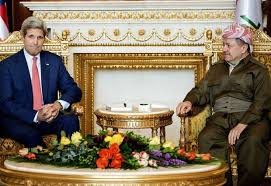 Baghdad, Iraq (CNN)�-- The sprawling offensive by militants in Iraq has now reached the country's largest oil refinery, but it's unclear who has control of the strategic target.
Baghdad, Iraq (CNN)�-- The sprawling offensive by militants in Iraq has now reached the country's largest oil refinery, but it's unclear who has control of the strategic target.On Tuesday morning, the state-run Iraqiya news agency said that security forces still control the Baiji oil refinery and that airstrikes killed 19 militants.
Iraqi special forces killed the militant leader who led the attacks against the refinery and goes by the name of Abu Qutada, the agency said.
But hours earlier, militant fighters believed to be from the Islamic State in Iraq and Syria, or ISIS, seized the refinery, several Iraqi security sources told CNN.
CNN cannot independently confirm either claim.
The Baiji refinery, in the northern Salaheddin province, is a crucial resource because it refines much of the fuel needed for domestic consumption. Long lines have already formed at many gas stations across the country.
Kerry arrives in Irbil
Farther north in Iraq, U.S. Secretary of State John Kerry arrived in Irbil on Tuesday to discuss how Kurds can help the central government tackle security and political challenges.
Irbil is the seat of the Kurdistan regional government. Iraqi Prime Minister Nuri al-Maliki's Shiite-dominated government is accused of fostering sectarian tensions by marginalizing the country's Kurd and Sunni Arab minorities.
Kerry met with Iraqi Kurdish President Massoud Barzani shortly after his arrival.
"We are facing a new reality and a new Iraq," Barzani said as the two men sat down.
In an exclusive interview with CNN's Christiane Amanpour, Barzani said "Iraq is obviously falling apart."
"And it's obvious that the federal or central government has lost control over everything,"�Barzani said�Monday. "Everything is collapsing -- the army, the troops, the police."
Barzani's exclusive interview with Amanpour
In an interview Tuesday with CNN's Jim Sciutto, Kerry praised Kurdish leaders for their "organized and focused and disciplined leadership," saying it has resulted in economic vitality.
"The rest of Iraq ought to look like this," he said.
Kerry said forming a new government that represents the interests of all of Iraq's ethnic and religious groups is a crucial precursor to whatever action the United States might take to intervene in the crisis unfolding there.
"The key is, if you don't have a viable government that is a unity government that is not going to repeat the mistakes of the last few years, whatever we might choose to do would be extraordinarily hampered," Kerry said. "It would be very difficult to be successful if you were just engaged in some kind of military activity, because there's no ultimately just a military solution there."
He rejected any notion that failure to intervene militarily in Iraq, or before that in the war in Syria -- where ISIS has gained much of its strength -- has led to the current crisis.
"... You've got to have a holistic, comprehensive approach, and the President is trying, as we are, I am, whether or not Iraq is prepared to be part of that," he said.
ISIS racks up more victories
City after city has fallen out of government control and into the hands of ISIS, which is trying to create an Islamic state across Sunni areas of Iraq and Syria.
Despite the breathtaking gains, militants aren't stopping. Over the weekend, ISIS captured two more crucial towns on Iraq's Syrian and Jordanian borders, and officials said the militants controlled at least 70% of Anbar province.
But the Iraqi military says it's made strides, too.
A spokesman for Iraq's counterterrorism service told CNN that two senior ISIS figures -- an Algerian militant named Abu Omar al-Baghdadi and Abu Hafsa, the self-styled governor of Tikrit -- were killed late Monday in airstrikes in Tikrit, the hometown of former Iraqi leader Saddam Hussein.
The spokesman, Sabah Al-Nouman, offered no evidence of the deaths, and CNN cannot independently confirm the claim.
Iraq's military spokesman, Maj. Gen. Qassim Atta, also said Iraqi security forces have regained control of two key border crossings after briefly losing them to the militants.
In a briefing in Baghdad aired on state TV, Atta said Iraqi forces, with the help of Sunni local tribes, retook al-Walid, the border crossing at al-Qaim that connects Iraq with Syria. He also said Iraqi forces have retaken the Trebil border crossing between Iraq and Jordan.
He also said that all towns between Samarra and Baghdad, 80 miles (129 kilometers) to the south, are in the hands of Iraqi security forces.
He added that fighting against ISIS fighters was still going on in northern Babylon province, south of Baghdad.
CNN cannot independently confirm the claims.
Three years after Iraq eagerly bid U.S. troops farewell, some Iraqis told Sciutto that they would welcome them back.
"America will not accept the presence of al Qaeda and (ISIS) in the region because that will impact on the Middle East region and the Arab states. It will have an effect on America, too," resident Ammer al-Shamri said.
"Therefore, I think there is a solution in Kerry's bag to solve the crisis."
Destination unknown: Will Kurds use oil to break free from Iraq?
Western-born jihadists rally to ISIS's fight in Iraq and Syria
By CNN
The Iran Project is not responsible for the content of quoted articles.











